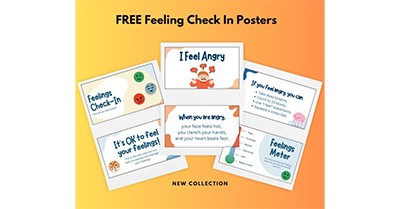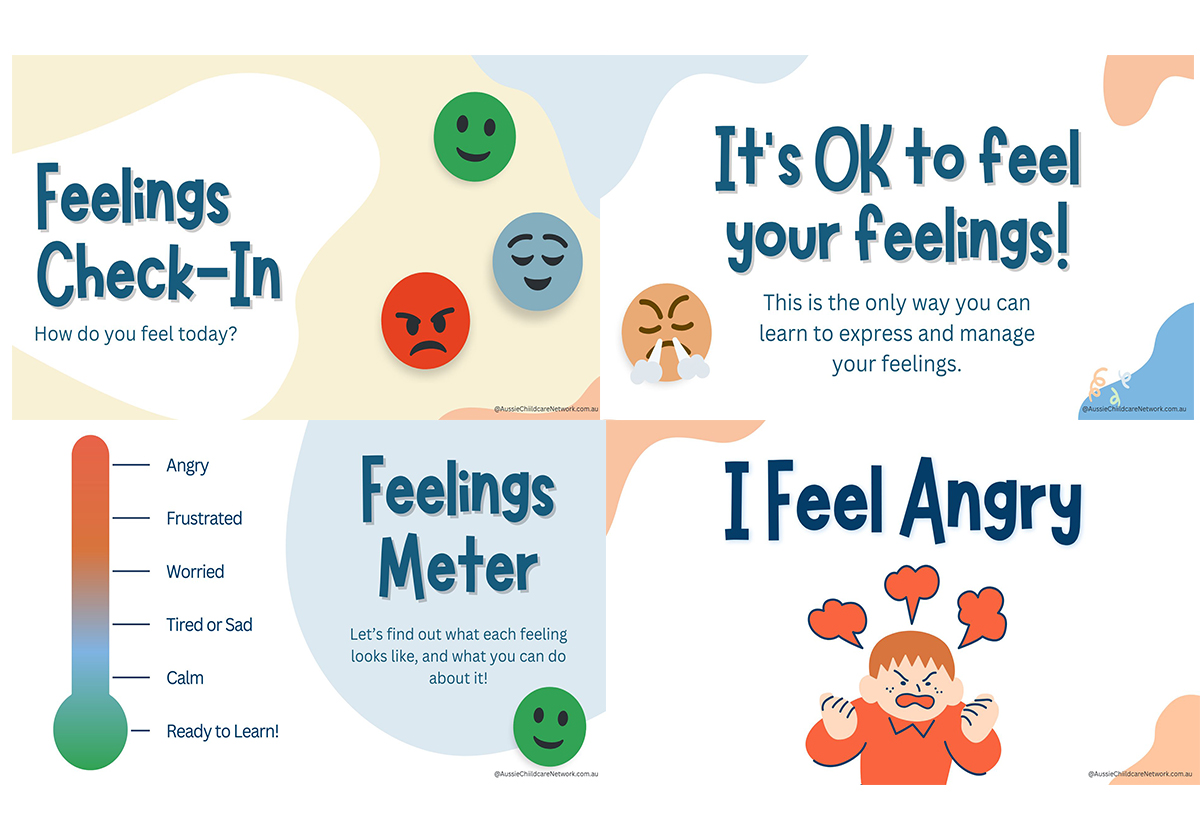In early childhood settings, emotional literacy is foundational to well-being, learning, and relationships. The free printable Feeling Check-In posters featuring clear visuals, child-friendly language, and actionable strategies offer educators a powerful way to support children in identifying, expressing, and managing their emotions. Whether used during transitions, check-ins, or moments of dysregulation, these posters help embed emotional intelligence into daily practice.
Feelings Check-In Posters is a set of 18 posters, a powerful tools for fostering emotional literacy and self-awareness in early childhood settings. Designed with vibrant visuals and child-friendly language, they help children identify, name, and express a wide range of emotions—from anger and frustration to calm and excitement. Each poster offers simple, actionable strategies for regulation, such as deep breathing, asking for help, or using “I feel” statements, making them ideal for trauma-informed and emotionally intelligent practice. Educators can use them during morning check-ins, transitions, or moments of dysregulation to support children in building emotional vocabulary and resilience. Whether displayed on classroom walls, embedded in documentation kits, or used in small-group discussions, these posters promote a culture of empathy, safety, and connection—aligning beautifully with EYLF wellbeing outcomes and sector-wide goals for inclusive, responsive care.
Benefits of Using Feelings Posters
-
Promotes Self-Awareness
Children learn to name their emotions (e.g., angry, frustrated, worried, calm, excited) and recognize physical cues like clenched fists or fast heartbeats. -
Supports Regulation Strategies
Each poster includes simple, trauma-informed strategies such as deep breathing, counting to ten, or using “I feel” statements, empowering children to manage big feelings safely. -
Amplifies Child Voice
Visuals and affirming messages like “It’s OK to feel your feelings” validate children’s experiences and encourage authentic expression. -
Strengthens Educator Practice
Educators can use posters as prompts for reflection, conversation, and documentation, aligning with EYLF principles of responsive, inclusive care. -
Fosters a Safe, Predictable Environment
Consistent use of emotion tools helps children feel seen, heard, and supported especially important in trauma-informed and neurodiverse settings.
Linking to EYLF Outcomes
These posters directly support several EYLF outcomes and principles:
| EYLF Outcome | Connection to Feelings Posters |
|---|---|
| Outcome 1: Children have a strong sense of identity | Children feel safe to express emotions and develop self-awareness. |
| Outcome 3: Children have a strong sense of wellbeing | Posters promote emotional regulation, resilience, and coping strategies. |
| Outcome 5: Children are effective communicators | Visual tools support verbal and non-verbal expression of feelings. |
| Practice: Responsiveness to children | Educators respond to emotional cues with empathy and support. |
| Principle: Secure, respectful relationships | Posters foster trust and emotional safety in educator-child interactions. |
How to Use the Posters
-
Morning Check-Ins
Invite children to point to how they feel using the “Feelings Meter” or “Feelings Check-In” posters. -
Transition Support
Use posters to help children regulate before and after high-energy activities (e.g., outdoor play, group time). -
Documentation Tools
Embed posters into learning stories, portfolios, or inquiry maps to show emotional growth and child voice. -
Calm Corner Displays
Place posters in regulation spaces to guide children through calming strategies when overwhelmed. -
Group Discussions
Use posters as visual prompts during circle time to explore emotions, empathy, and coping skills.
Extension Ideas
-
Create Emotion Journals
Children draw or write about how they feel each day, using poster language as prompts. -
Role Play Scenarios
Act out feelings and practice strategies (e.g., squeezing a stress ball when frustrated). -
Auslan or Gesture Integration
Pair posters with hand signs for inclusive, multimodal communication. -
Family Engagement
Send mini versions home to support emotional literacy beyond the service. -
Inquiry-Based Projects
Use posters as a launchpad for child-led inquiries into emotions, body signals, and well-being. -
Advocacy Use
Include posters in sector-wide campaigns to highlight the importance of emotional safety and educator-led regulation support.
These printable Feelings Check In posters are more than decorative tools; they’re scaffolds for emotional growth, relational safety, and pedagogical depth. By embedding them into daily routines, educators affirm that all feelings are valid and that children deserve spaces where their emotions are understood, supported, and celebrated.
When emotional literacy is visible, responsive, and embedded in practice, children thrive, and so does the sector.
DOWNLOAD FREE HERE: Feelings Check-In
MORE: Feelings Printables

